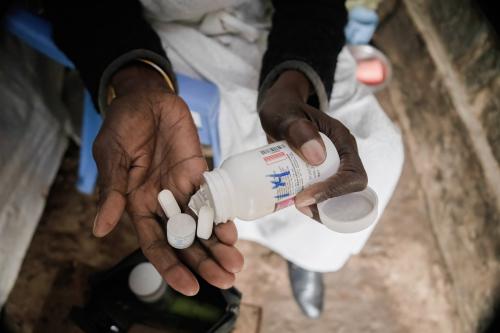Below is a viewpoint from the Foresight Africa 2022 report, which explores top priorities for the region in the coming year. Read the full chapter on public health.
 Transitioning some 900 million Africans from biomass fuels to more affordable and environmentally friendly options over the next year could help prevent the deaths of millions of Africans (particularly women and children), foster social stability, and unlock significant labor market productivity. Each year, air pollution caused by environmentally hazardous wood and coal cooking technologies results in respiratory illnesses, natal complications, heart disease, and premature deaths of children. Globally, such pollution accounts for almost 60 percent of black carbon emissions, which amount to a gigaton of carbon dioxide annually. Concerted efforts over the past decade have failed to make an appreciable dent in biofuel use across the continent—partly because most households are yet to have access to, or afford, viable options for clean technology. (For more on strategies for addressing the drivers and impacts of climate change, see Chapter 4).
Transitioning some 900 million Africans from biomass fuels to more affordable and environmentally friendly options over the next year could help prevent the deaths of millions of Africans (particularly women and children), foster social stability, and unlock significant labor market productivity. Each year, air pollution caused by environmentally hazardous wood and coal cooking technologies results in respiratory illnesses, natal complications, heart disease, and premature deaths of children. Globally, such pollution accounts for almost 60 percent of black carbon emissions, which amount to a gigaton of carbon dioxide annually. Concerted efforts over the past decade have failed to make an appreciable dent in biofuel use across the continent—partly because most households are yet to have access to, or afford, viable options for clean technology. (For more on strategies for addressing the drivers and impacts of climate change, see Chapter 4).
Adopting less polluting cooking fuels across Africa will reduce the financial, environmental, and social costs imposed by frequent illnesses and untimely death that result from the use of biomass fuels. Research indicates that smoke inhalation from indoor and outdoor cooking with such polluting fuels cause between 1.6 million and 3 million deaths of African children every year. These poor health outcomes further impose a substantial socio-economic burden on families. Figure 2.9 illustrates how wood and charcoal provide cooking fuel for almost three-quarters of African households.
The impacts of these fuels are also felt on the local economy and labor force. On average, African women spend 20 hours a week collecting firewood and up to 4 hours a day cooking on traditional stoves. Adopting cleaner and more efficient cooking fuels will free this important segment of Africa’s labor force up to engage in economic activity, thereby making households more likely to be able to afford cleaner fuels and technology. Furthermore, improved health outcomes will save households money and facilitate greater investment in human capital. Environmentally, biomass fuel is estimated to be responsible for the deforestation of 2 million hectares per year—twice the size of The Gambia.
African households must be able to afford alternative fuel sources—a fact highlighted by the COVID-19 pandemic, which pushed some 100 million Africans back into using wood and coal because they could no longer afford clean energy options.
While African countries renewed their commitment to transitioning from polluting cooking fuels at the U.N. Climate Change Conference (COP26), they were resolute in their call for an affordable energy transition. African households must be able to afford alternative fuel sources—a fact highlighted by the COVID-19 pandemic, which pushed some 100 million Africans back into using wood and coal because they could no longer afford clean energy options. Affordability is an important variable in this context, as the highest death rates from cooking fuel pollution occur in poorer African countries. Furthermore, over the short to medium terms, the transition must be based on Africa’s comparative advantage. A pivot to natural gas would meet these requirements.
Recent research from the University of Liverpool suggests that attainable supply-side interventions, like reducing the distance to liquefied natural gas (LNG) retail points and improving access to affordable multi-burner stoves, could expand usage by up to 58 percent of households by 2030. Moreover, the combination of increasing incomes, a more tech-savvy population, and growing urbanization suggests a growing market for cleaner cooking solutions. Capital investments in this sector will not become “stranded assets” for two reasons. First, the quantitative and qualitative growth of domestic markets bodes well for profitability. Second, any investments would have been fully amortized by 2050. The transition away from biomass cooking fuels will enable the continent to invest in the technology and infrastructure that will facilitate the adoption of even cleaner fuel sources in the future.
Affordability is an important variable in this context, as the highest death rates from cooking fuel pollution occur in poorer African countries.
Africa’s just energy transition is an urgent imperative; it is no longer an option. African governments and their development partners must step up to provide the right incentives alongside an enabling regulatory ecosystem to expedite this transition. Through its Climate Promise, the United Nations Development Program (UNDP) is committed to working with governments and local communities to increase access to clean and affordable energy for 500 million Africans. Urgent attention must also be given to innovative financing mechanisms. Blended finance could help de-risk the capital required for longer-term investments in the infrastructure required to provide LNG access to households, particularly those in remote locations. Incentives should also be extended to local small- and medium-sized enterprises so that they can provide the technology and products to support Africa’s just energy transition at the household level.
The Brookings Institution is committed to quality, independence, and impact.
We are supported by a diverse array of funders. In line with our values and policies, each Brookings publication represents the sole views of its author(s).










Commentary
Africa’s just energy transition could boost health outcomes
March 18, 2022